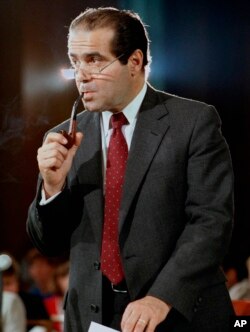Shock spread through official Washington and beyond Saturday, as word came of the death of Antonin Scalia, an associate justice of the U.S. Supreme Court known for his towering intellect, outsize personality and conservatism.
Scalia, 79, was found dead early Saturday at a resort in western Texas, with early reports attributing the death to natural causes.
The White House expressed President Obama's "deepest condolences" to the Scalia family, while Supreme Court Chief Justice John Roberts, in a statement, called Scalia an "extraordinary individual and jurist, admired and treasured by his colleagues."
Texas Governor Greg Abbot called him "a man of God, a patriot and an unwavering defender of the written constitution."
Rapid Rise Linked to legal writings, wit
Appointed in 1971 by President Richard Nixon as counsel for the Office of Telecommunications Policy, Scalia was later nominated by President Ronald Reagan to the District of Columbia Circuit Court, where he built a conservative record in large part, according to analysts, based on his powerful and eloquently crafted legal writings.
He so impressed Reagan administration officials, including Attorney General Ed Meese, that Reagan named him to the Supreme Court in 1986 to fill the seat vacated by the appointment of William Rehnquist as chief justice.
The first Italian-American to serve on the court, the outspoken Scalia was an staunch opponent of abortion, affirmative action, and what he called the "homosexual agenda."
He was also renowned for his sharp questioning of lawyers presenting cases to the court. In 2009, author Joan Biskupic quoted a study showing he provoked laughter on the bench more often than any of his colleagues.
Key role in 2000 Bush versus Gore case
Scalia played a pivotal role in in the court's 2000 decision Bush vs. Gore, which ended a recount of the presidential vote in Florida, effectively deciding the presidency for George W. Bush. Years later, he continued to tell critics of that decision to "get over it."
Writing in The New Republic, Judge Richard A. Posner, a senior lecturer at the University of Chicago, described Scalia in 2011 as "the most influential justice of the last quarter century."
Lawyer Adam Liptak, Supreme Court correspondent for the New York Times, called him "a champion of originalism," the theory of constitutional interpretation that seeks to grasp and apply the understanding of those who drafted and ratified the Constitution.
"In Justice Scalia’s hands, originalism generally led to outcomes that pleased political conservatives, but not always," Liptak writes. His approach was helpful to criminal defendants in cases involving sentencing and the cross-examination of witnesses.
Scalia was the only child of an immigrant father and an Italian-American mother. He was raised in a multi-ethnic neighborhood of Queens in New York City.
He enrolled at Georgetown University in Washington, graduating with honors in 1957, and then attended Harvard Law School, where he met his wife of 48 years, Maureen McCarthy.
Scalia is survived by nine children and 28 grandchildren.






